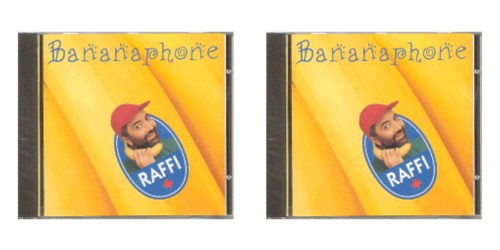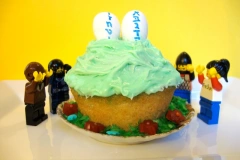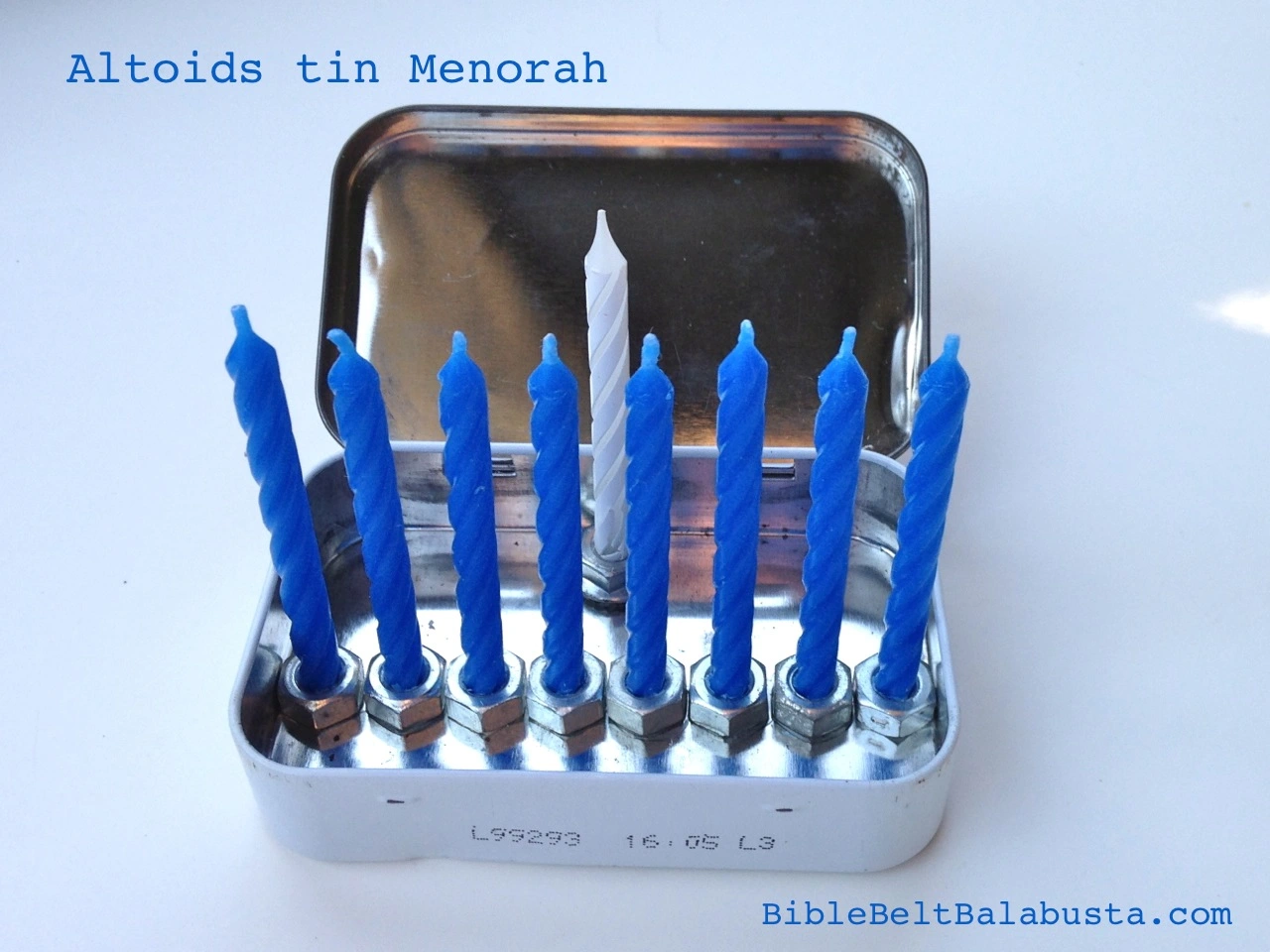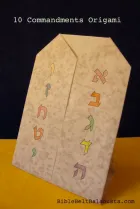
Bananaphone CD by Raffi
Dear Holocaust Education curriculum creators, teachers and parents,
Do you know about Raffi’s Holocaust song? No one else seems to, either. If Raffi knows, he’s not telling.
“The Changing Garden of Mr. Bell.” You’ve probably heard it. It’s gorgeous. I found a YouTube clip of the whole thing (which might be illegal?), and I’ve typed the lyrics below.
Raffi didn’t write “The Changing Garden of Mr. Bell.” Janice Hubbard and Michael Silversher co-wrote it for an album by Parachute Express: Happy to Be Here (1991), and Raffi recorded a different arrangement on the humongously successful Bananaphone (1994). Millions of kids and parents have heard the song. But how many of us have really heard it?
As I said, it’s gorgeous. That’s enough, right there. It’s a song about an old man with a garden, as seen through the eyes of a kid next door. It’s the “through the eyes of” element that makes the song so subtle. The child sees and does not understand. What’s to understand? A lot, or a little. It depends, and it can work either way. But, because yesterday was Yom Hashoah, a day to remember and to teach about the Holocaust, I thought I’d mention the “a lot.”
For my own part, I do not know when and how to introduce kids to what happened during the Shoah. I am not urging anyone to present this song to a child in the context of the Holocaust. I’m just asking you, the grownup, to listen to it in that way. I’d be doing the songwriters a disservice if I advised adults to beat the simple beauty out of a song by making kids “understand” it before they are old enough. The genius of “Mr. Bell ” is that it can be understood on multiple levels, and all are beautiful. My preschooler loves the song and I’m keeping my mouth shut. My teenager still loves the song—we’ve had the Raffi album since it debuted—and loves it all the more now that she realizes what it is “really” about. More on that in a moment.
For Holocaust education, I posit that the most useful place to use Mr. Bell might be with adults. Maybe high school, maybe middle grades, but not younger. To appreciate the power of the song, a listener has to be old enough to appreciate the discrepancy between form and intent. A song about a child, in the voice of a child, marketed to children, but about a Holocaust survivor. . . Simple, yet complex; sweet, yet chilling.
My teenager is a case in point. She grew up hearing the song. When she was about 13, she heard it again, with a new sibling in the house. That’s when I asked her to listen to the words with me as clues to a deeper story. Mr. Bell is “foreign.” He drinks tea instead of coffee. He grows edelweiss, a plant she knows from The Sound of Music (“it’s an Austrian thing”), and she wondered if Bell wasn’t short for a longer, more “ethnic” name. She agreed that the missing wife and child could have been “lost” in the Holocaust, and that Mr. Bell copes by immersing himself in a “changing garden” full of life—including plants native to wherever he is from—just outside his lace-curtained window.
Boom. Suddenly, the beautiful song, thought to be about gardening, is also really, super-duper sad. Did I ruin it for her? In a way, yes, but in a way, she appreciates the subtle complexity. It is sad, but there are notes of hope, life, continuity, attentiveness, stewardship and best of all, there is the intergenerational relationship between Mr. Bell and the lucky, free-range kid next door.
But, it’s still a song about gardening. My children’s stellar preschool teacher plays it every year to supplement a gardening unit. I heard it there a couple of weeks ago and asked if she’d ever considered alternate meanings. She had no idea the song might be “historical.” When I shared my theory, she did a bit of Googling and sent me a link to a random blog post I’d seen before, a speculation about how Mr. Bell had murdered his family and buried them in the garden. I admit, that’s funny, if incredibly creepy. Again, it’s the powerful contrast between form and intent. It stops being funny when I consider that Mr. Bell’s family “really” was murdered, but not likely buried in a garden. More likely in a mass pit or swept away as oven ash.
And is this the real intent? Is this a song about something “historical?” The same day I heard “Mr. Bell” at preschool, I got online. All my previous searches revealed nothing: no mention of the song title with search terms Holocaust or Jewish, no footnote embedded in Holocaust education pdfs, not even a themed customer songlist on Amazon. All I got were a few comments attached to the unofficial YouTube video (see link above), and a 2003 blog post by a law professor, in which he takes the time to type the lyrics and insert his own ponderings in brackets. He, too, wondered if the family is the “secret” fertilizer in the garden, but at least he referenced the Holocaust. (Wikipedia tells me the professor has investigated the death of his great uncle, deported by the Nazis.) And, at least both sites indicated that someone, somewhere agreed with me that the song could be about a survivor of the Holocaust. Small comfort, really. It was time to get to the source: the people who created the song.
I found composer Michael Silversher first, and he replied within moments. He forwarded our correspondence to his former colleague Janice Hubbard, who also replied quickly. They were both so gracious, so appreciative, and they both confirmed the subtext of “The Changing Garden of Mr. Bell.” Hubbard wrote the lyrics. She says Mr. Bell is “clearly” Jewish, and “his story was not the kind of tale you find in a children’s song, but the metaphor of his changing garden works on many levels. . . .Mr. Bell was (and is) very real to me; it was more like writing a biography than an imaginary story.” That’s what it sounds like: biography in short, poetic form, open to interpretation. I get verklempt every time I listen.
Michael Silversher says he’s “gotten so many wonderful comments over the years from all kinds of people,” and it is one of his most favorite songs, “a beautiful collaboration” with Hubbard, “who had the story in her heart.”
Silversher also told me that the first incarnation of the song—before Raffi’s famous one—with Silversher’s arrangement and Hubbard’s vocals, is worth seeking out. I found it on iTunes and bought the single, and he is right. It’s fun to contrast and compare. Hubbard’s bright voice changes the melody here and there, and has a storytelling quality that makes the vignette seem more immediate. The musical texture takes the “changing” nature of the garden literally and changes all over the place after the last verse: in tempo, dynamics, color, harmony, and leaves listeners with a soft resolution and twinkling hope. Raffi’s postlude is lovely, too, of course. He’s Raffi. Do listen.
If this post were a “real” article for a publication, I’d try to interview Raffi about the song, but I leave such efforts for someone else to pursue. My guess is that Raffi understood the subtext, but wisely chose to present it without comment, to let listeners listen however they listen. Raffi is all about “honoring the child.” I believe this is how the song is presented by its makers on the first version, and how the song should continue to be presented to children. Commentary can come later, as with Torah stories. Stories first, commentary later. For us grownups, however, I believe the song bears a good, close reading.
How would I use it in a classroom? My idea would be to play the song first, with no pre-lesson, and then ask the listeners to describe what they heard. A second hearing with the lyrics visible can further class speculation and discussion. Desired outcomes and objectives? I haven’t gotten that far, yet.
Here are the lyrics, which do fine speaking for themselves. Find both versions of the song on iTunes or Amazon mp3s.
“The Changing Garden of Mr. Bell”
(by Janice Hubbard and Michel Silversher)
Mr. Bell’s from a foreign place, his family all were farmers
He arrived from across the sea, and came to be next door
And he works his land,
With a knowing hand,
Though it’s very small, he makes it grow so well
In the changing garden of Mr. Bell.
These are astors and edelweiss, and rows and rows of roses
Those are hives in the dogwood trees, for bees to come and go
It’s a wondrous sight,
In the morning light,
And the earth is full, every color, every smell
In the changing garden of Mr. Bell
I once saw a photograph, upon his mantle shelf
Of a beautiful lady, a child in her arms
And the young Mr. Bell himself
I wondered out loud about them,
And he answered in the strangest way,
He just said, “Look, see how the garden grows,
It’s always changing every day.”
Mr. Bell has his morning tea, and I will bring his paper
See the sun through the curtain lace dapple his face and hands
Every day is new,
There is much to do,
Life’s a mystery, full of secrets that might tell
In the changing garden of Mr. Bell.




















Thanks, Joanna. I had never heard the song. Just listened to it. So sad. Of course, my mind wandered to my relatives who, like Mr. Bell’s wife and child, weren’t able to plant and nurture gardens.
I was completely unfamiliar with this song. So beautiful. And so terribly sad. Hamevin yavin…
Thank you so so much for posting this information about The Changing Garden of Mr. Bell.
I am familiar with Raffi but have never listened to much of his music, until a road trip with my family last week – my 8-1/2 yr old wanted us to play the Bananaphone disc (which title track I already knew) and so I was happy to oblige. The sad sweetness of the opening bars of Mr. Bell gave me a hint that that song was going to be quite a bit different so I better brace myself – I am given to emotion! I managed to not listen to the lyrics until I was driving with my 2 yr old alone, trying to get her to nap, and in listening to the 3rd verse, I promptly burst into wailing sobs, in the middle of rush-hour traffic when I very much needed to be alert! I still can’t even think of that song without crying (even now as I write this – not good, with a client coming in shortly!). It was so obvious to me that Mr. Bell’s wife and child had died, although I did not catch the Holocaust connection at first (now it’s clear). What I still just cannot grasp is the saying that “life’s a mystery” – I certainly know the expression, and agree that “life’s not a problem to be solved,” but at this stage in my life I almost see life as an ordeal to be endured (not that I have anything to endure), and I hope one day I will be able to see the mystery in life. Thank you again so very very much – I’ll try to stop crying now!
I just happened across this posting. I am a child and grandchild and son-in-law of Holocaust refugees and victims. I listened to this song with my girls when they were little and was also struck by the sadness behind the song. I’d like to note, though, that this interpretation reflects an unfortunate tendency we have to position the Holocaust at the center of all understanding of genocide — a regrettably ethnocentric tendency. While I agree that the song implies a tragic end to Mr. Bell’s family in a foreign land, there isn’t one single hint in the song that the tragic end was the Holocaust (as opposed to some other tragedy). How do we know that Mr. Bell is not Asian, and he’s not referring to Cambodia? More pointedly, given that Raffi is of Armenian, not Jewish, ancestry, how do we know that Mr. Bell is not referring to the Armenian genocide? I know Raffi didn’t write the song, but given that he chose to record it, I would imagine it’s at least as likely that in the recording that we are familiar with, the singer is referring to the murder of Armenians, not Jews.
Now, as listeners, we are of course free to imagine whatever we want into the song, and I too heard suggestions of the Holocaust when I used to listen to the song. But that’s something *I* am putting into the song; it doesn’t make the song itself a “Shoah song.”
My claim that “Mr. Bell” is about a Jewish man who lost his family in the Holocaust is based upon my communication with the two people who actually wrote the song.
Joanna, I am the law professor you reference in the article. I apologize for not reading more carefully the part in which you explain the songwriters’ direct assertion that Mr. Bell is Jewish.
It does strike me as noteworthy that the songwriters did nothing to mark Mr. Bell as Jewish in the song itself, but chose to leave his ancestry open to the listener’s imagination.
I stand by my larger point: I think the genius of the song is in its vagueness — in the songwriters’ refusal to link Mr. Bell’s faraway trauma to a particular historical episode. Now it’s certainly possible that Raffi contacted the songwriters and said, “What’s this song about, anyway?” and they said, “Oh, Raffi, it is a song about the Shoah; Mr. Bell is a Holocaust survivor,” and Raffi said, “Excellent! I have always wanted to record a song about the Holocaust.” But I would prefer to imagine that the song might have special meaning to Raffi because HIS ancestors (like ours and like Mr. Bell’s) were murdered en masse on account of who they were. In other words, rather than (as it were) deploying Raffi as a singer about Jewish suffering, I would rather deploy him as a singer about Armenian suffering. I think that pedagogical move would introduce kids to something they likely don’t know anything at all about — the Armenian genocide — and then set up the opportunity for some very good teaching about what’s universal, rather than specifically Jewish, about mankind’s recurring practice of murdering people on account of their race, ethnicity, or beliefs.
Thank you for writing about this beautiful and touching song and bringing it to the attention of more people.
Thank you for this exchange, I posted the 3rd comment on this thread. Like Prof. Muller I am involved in law as well, I am a family law lawyer in Canada (small world). I think another reason why I found this song to be so poignant is because of the terrible guilt I feel – I am 1st generation Canadian, my parents (born in 1928/30) were German. I appreciate your perspective, Professor, and after all isn’t that what good art is all about – the specific applying to humanity/the world as a whole.
Michelle, thank you for leaving both comments here, and for sharing how you’ve found this song to be meaningful. The song is elastic enough to serve specifics and generalities, and we need both. “Life’s a mystery…” (P.S. If you are still on a Raffi kick with your children, I much prefer the later work—-Bananaphone is perfect—to the very, very early work. Quite a difference.)
Eric, I thought your name looked familiar!
Yes, the “changing garden” can change according to whomever hears it, and I agree that this is indeed the genius of the song.
Because I suggest the song can be a entree into some sort of Holocaust-related study does not mean that the song cannot be used for any other subject. I would hope that any teacher broaching the subject of genocide does so within a wider, historical context. And, I hope that this post and comment thread can help make it so.
Thank you for your thoughtful comments.
The Holocaust interpretation is not one I’d ever heard before, but it fits pretty well. For me, it has a special connection because my mom talked about a man in her neighborhood who had a lovely well-kept garden, gave the kids chocolate if their hands were washed, treated the many children in the poor, diverse neighborhood as basically grandchildren. They called him Gardenman. He and his wife, Gardenlady, were from Latvia, a Jewish couple whose son was killed in the uprising (his picture was on the mantlepiece) He had been a concert pianist, she was an opera singer, until he had lost a finger. (Supposedly in a car door, but I wonder). Their daughter became a lawyer, and would pick them up for Sabbath every week. They were so proud of her. And one day, many years after the couple’s deaths, after my mom grew up and got married and had kids, she heard this song and wept. She played it for her older sister and asked who this man in the song was. “Gardenman.” For me, that hits home, it makes it so much more personal. Even though I never once met Gardenman or Gardenlady, they feel real to me, and that’s why the song is so vivid. “Life’s a mystery, and secrets that might tell, in the changing garden of Mr Bell.”
What a beautiful, painful story, Addie. Thank you sharing it here.
Addie Berg’s comment above is so moving. I am just now listening to Raffi’s 10/17/14 radio interview on The Brian Lehrer Show. Raffi is asked about this song, clarifies he wasn’t the writer, and says, “it’s a beautiful, beautiful song. It took me a long time to rehearse it, to make it my own, but I’m glad you enjoyed it. It’s a tender and lovely, lovely song.”
Andrew, thanks for the heads-up about the Raffi interview. I haven’t heard of it and will try to find it now…